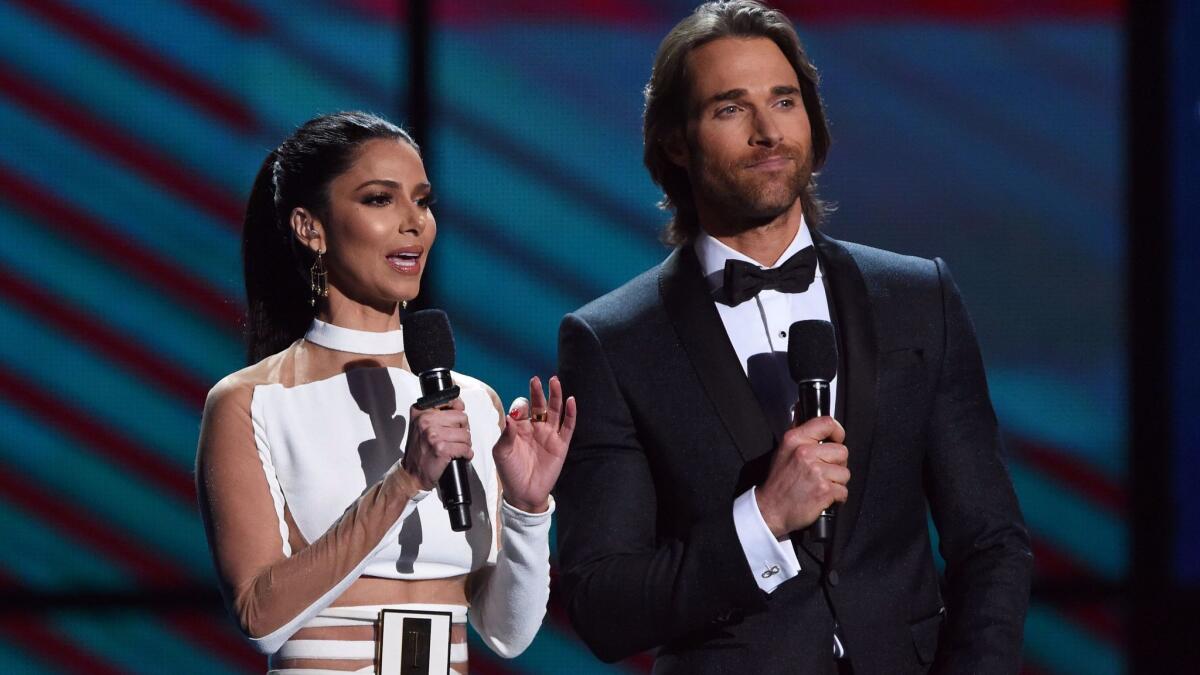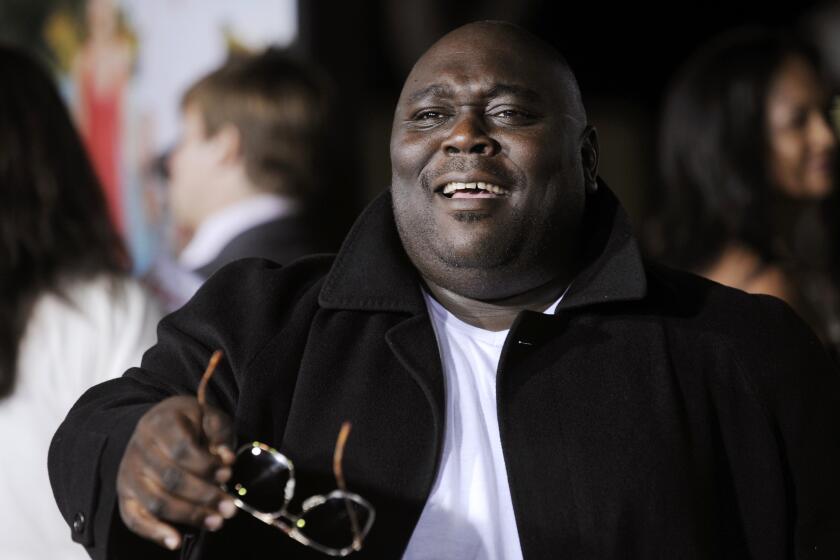Latin Grammy organizers asked press not to broach political topics at awards ceremony

- Share via
A publicist connected with the Latin Academy of Recording Arts & Sciences, which last week held the 17th Latin Grammy Awards in Las Vegas, asked journalists at the awards ceremony not to ask questions about politics — leading one reporter to speak out publicly against the request.
Gaby Natale, who was covering the show for the Dallas-based television program “Super Latina,” which airs on the Vme network, says the request came as “a shocker.”
“Right at the beginning, one of the representatives, who was handling press for the academy, she went on stage and told us the usual stuff — about pictures, where flash is allowed, where flash is not allowed,” said Natale by telephone. “Then she said, ‘I’m going to ask you something more: Please don’t ask any questions related to politics.’”
Natale says she was surprised by the request — the first time in her three years covering the awards ceremony that such a plea has been made.
“It’s unacceptable to tell journalists they cannot ask political questions,” she says, “especially one week after one of the most consequential elections for Latinos.”
Natale, who has won Emmy Awards for her television work, was so upset by the demand she Tweeted about it during the ceremony. “In the press room @latingrammy, we’ve been told not to ask questions about politics,” she wrote. “What a mistake to silence topics that are so important.”
Her Tweet was later picked up by the Latino news website Remezcla, which first reported the story.
The Latin recording academy did not respond to several requests for comment on the subject. But another journalist who was present, and who asked not to be named for professional reasons, corroborated Natale’s account.
Likewise, Natale posted a video to YouTube, taken the night of the awards, in which she asked the academy’s president, Gabriel Abaroa, if it was the academy’s policy to limit the subjects the news media could cover.
“No, it’s not the policy of the academy,” he stated in Spanish. “I think the policy of the academy is to try to concentrate on music and what happened today.
“There’s a risk that an artist could make a declaration and that it would look like the academy made it,” he added.
But, he also noted: “With no artist, do we say what they should say or not upon acceptance. We’ve never done that. And we would never do that.”
Despite the no-politics request, journalists nonetheless asked musicians questions about the election.
Billboard reported late last week that the subject came up repeatedly in the press room, quoting a member of the Mexican regional group Banda El Recodo who stated: “We hope Mr. Trump changes his tune and gives us a good government.”
Over the last few years, the Latin Grammy Awards have been the site of some heated political moments. Two years ago, Calle 13 showed support for the 43 disappeared students in Mexico, and last year the bands Maná and Los Tigres del Norte held up a sign saying, “Latinos United, Don’t Vote for Racists.”
This year’s telecast was decidedly cooler on the politics: Singers Pablo Lopez and Juanes opened with the single, “Tu Enemigo” (“Your Enemy”) that dealt with the issue of immigrants being considered an enemy, and actor Diego Luna issued a call to “fight hate and discrimination.” But overall, performances and thank you speeches stuck to a script focused on music.
More pointed was the untelevised portion of the ceremony, in which singer Carla Morrison, who took home the award for alternative song, made a strong statement against Trump.
In her comments, posted to Instagram by her record label, Cosmica Artists, she stated: “Let’s not allow some orange … take away our mental, spiritual and emotional liberty.”
Natale says she felt compelled to speak out because the Latin recording academy’s request didn’t jibe with press freedom.
“I am an entertainment reporter,” she said. “But I am a citizen first.”
Sign up for our weekly Essential Arts & Culture newsletter »
Find me on Twitter @cmonstah.
ALSO
‘I feel good for speaking up’: YG on his 2016 protest anthem that goes after Donald Trump
For Mija, club-music success came quickly. Now she’s trying to subvert it
Dap-Kings’ Gabriel Roth recalls Sharon Jones’ last days: ‘She didn’t want to stop singing’
More to Read
The biggest entertainment stories
Get our big stories about Hollywood, film, television, music, arts, culture and more right in your inbox as soon as they publish.
You may occasionally receive promotional content from the Los Angeles Times.











